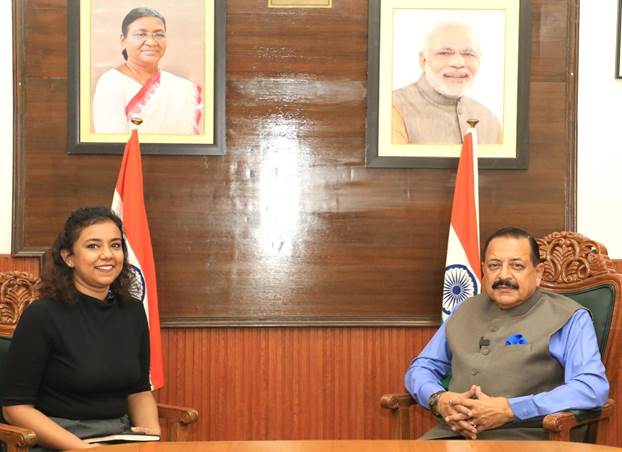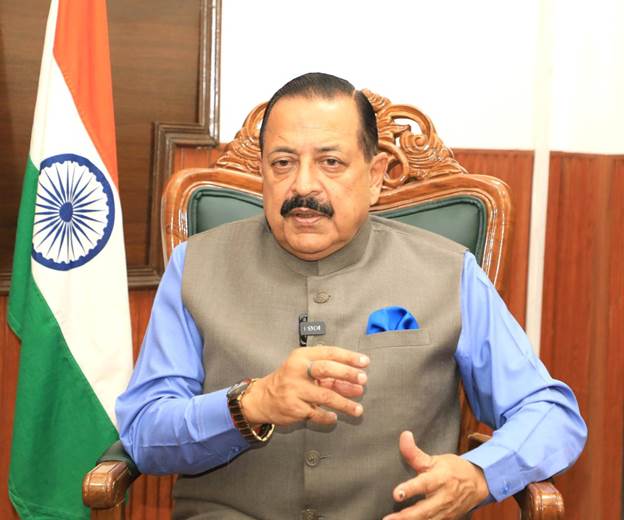Ministry of Science & Technology

Modi 3.0 “science push” aimed at realising “Viksit Bharat”, says Minister Dr Jitendra Singh
From launching a ₹1,000 crore venture capital fund to support Space StartUps to introducing the Bio E3 policy aimed at creating a bioeconomy, the Modi government’s major initiatives in the first 100 days of its third term signify its commitment to advancing India’s role on the global innovation stage
Global recognition garnered from achievements like the Chandrayaan-3 mission;
India’s Science and Tech Ambitions Reach New Heights: Dr. Jitendra Singh Details Transformative Initiatives
Posted On: 27 OCT 2024 3:13PM by PIB Delhi
In a forward-looking discussion with the media, Union Minister Dr. Jitendra Singh laid out the government’s bold and strategic vision for India’s science and technology sectors and said that Modi 3.0 “science push” is aimed at realising “Viksit Bharat”.
From launching a ₹1,000 crore venture capital fund to support Space StartUps to introducing the Bio E3 policy aimed at creating a bioeconomy, the Modi government’s major initiatives in the first 100 days of its third term signify its commitment to advancing India’s role on the global innovation stage, the Minister said..
The Minister highlighted that these initiatives not only bolster India’s scientific prowess but also contribute to a sustainable, self-reliant economy that can withstand global shifts in industry and resources.
Dr. Jitendra Singh opened by emphasizing the speed at which India has embraced major reforms in science and technology. “In the first 100 days of Prime Minister Modi’s third term, we have laid the groundwork for transformative changes in science, technology, and innovation,” he said. He pointed out that the Prime Minister’s vision prioritises long-term, out-of-the-box initiatives to ensure India’s leadership in critical domains like space exploration, biotechnology, and meteorology.

One of the major highlights of Dr. Jitendra Singh’s interaction was the announcement of a ₹1,000 crore venture capital fund exclusively for the space sector. This fund, approved by the cabinet, is part of a broader plan to leverage India’s growing base of nearly 300 space startups. In the span of just a few years, India has seen a remarkable shift in its space ecosystem, following the government’s decision to open the sector to private players.
According to Dr. Jitendra Singh, this decision has helped unlock India’s potential, allowing it to grow from a single-digit startup presence to an ecosystem with hundreds of space tech companies today.
“India’s space economy will play a critical role in our country’s growth,” Dr. Jitendra Singh noted, referencing the global recognition India has garnered from achievements like the Chandrayaan-3 mission. He further highlighted the Gaganyaan mission, India’s first human crewed space mission has been scheduled, which will include a female robot test flight as a final dress rehearsal before sending human astronauts into space. “Our advancements are not just about joining the ranks of other spacefaring nations, but also about leading with innovation, precision, and reliability,” he added.
With the Bio E3 policy, Dr. Jitendra Singh underscored a vision for a “bio-driven” future, asserting that the next industrial revolution will stem from bioeconomy initiatives rather than traditional manufacturing. The policy, which covers Biotechnology for Environment, Economy, and Employment, is designed to create self-sufficiency in resources while reducing dependency on imports. A key objective, he explained, is the shift from petroleum-based resources to biofuel alternatives, enabling waste-to-fuel transformations and other sustainable practices.
“Our natural resources, including rich bioresources along the Himalayas and a 7,500-Kilometre coastline, position us uniquely to drive this revolution,” Dr. Jitendra Singh said. “We’re tapping into the biotechnology potential of the regions, ensuring economic growth that is both inclusive and environmentally sustainable.”
Dr. Jitendra Singh also announced significant updates on Mission Mausam, an initiative launched within the first 100 days of Modi’s third term, aimed at enhancing the accuracy of meteorological forecasts. The mission, which integrates space and IT technologies, allows India to provide real-time, actionable weather forecasts, not only for India but also for neighbouring countries, including Bangladesh, Nepal, and Sri Lanka.

Reflecting on India’s legacy in meteorology, he acknowledged that the sector has struggled to receive adequate investment until recently. “Now, we’re not just forecasting the weather. We’re helping citizens understand the implications of weather events and prepare accordingly,” he said. New AI-driven applications will allow for hyper-local, hour-by-hour forecasts for farmers and other stakeholders who depend on reliable predictions. “Our aim is to deliver global-standard forecasts and move towards predictive models that empower our agricultural sector,” Dr. Jitendra Singh emphasised.
A cornerstone of India’s approach under Prime Minister Modi, Dr. Jitendra Singh noted, is an all-encompassing strategy where scientific disciplines converge to produce more impactful outcomes. He highlighted that such collaboration is essential to achieving India’s broader developmental goals, with the science and tech sectors working cohesively to drive transformative results.
Dr. Jitendra Singh pointed to the India-Germany science partnership as an example of this whole-of-science vision. Germany, hosting over 50,000 Indian students and researchers, has become a preferred destination for Indian scholars pursuing innovative projects. “Germany and India’s collaboration, particularly in areas like biotechnology and renewable energy, underscores the importance of international partnerships in realising our scientific ambitions,” he said.
Dr. Jitendra Singh closed by emphasizing that the government’s science and technology initiatives are rooted in a commitment to self-reliance and global leadership. By strategically investing in space and biotechnology, India is not only fostering economic growth but also aligning with the sustainable goals needed to tackle future challenges. These policies, he asserted, reflect the country’s ambition to lead in domains that impact both economic resilience and the well-being of the public.
India’s journey toward a self-reliant, scientifically advanced future is being mapped with each new policy, fund, and partnership, Dr. Jitendra Singh affirmed. “Our goal is to make science work for India – to solve our challenges, to drive our economy, and to ensure that our citizens benefit directly from every innovation and breakthrough we make.”
******
NKR/KS/AG
(Release ID: 2068661) Visitor Counter : 627




















